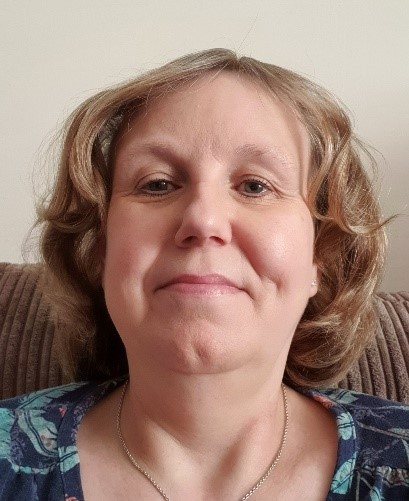Peer support volunteer Tracey ‘loud and proud’ of her talking therapies journey
Anyone experiencing feelings such as anxiety, depression or other common mental health concerns can get help from NHS Talking Therapies (also known as IAPT, Improved Access to Psychological Therapies). Support can be offered in a number of ways – one-to-one, in a group, by phone, video, interactive text or online.
Tracey’s mental health recovery began when she spoke to her GP about the issues in her life that had built up over time, leaving her feeling depressed and quite desperate at times. Her GP told her about NHS talking therapies and she was referred to her local IAPT service, Leeds Mental Wellbeing Service (LMWS). Tracey’s support involved cognitive behavioural therapy (CBT) which helps manage a person’s problems by changing the way they think and behave.
‘My first appointment was really hard,’ Tracey (pictured) says. ‘I had to describe how I felt and what the problem was. My therapist did a diagram of the things that were wrong and how many sessions I would need. I came away from those first sessions feeling sad, but I kept going back.
‘I was drinking a lot at the time. I knew it was making my depression worse but it was a habit I had for years. On the fourth session my therapist told me I would never get rid of my depression if I was still drinking. I was nervous about stopping as it was my crutch that kept me going. I needed someone to say that to me. I told her I couldn’t do it on my own and she got me an appointment at Forward Leeds, an alcohol and drug support service. The team at Forward Leeds helped me understand that I needed to stop drinking all together and what would happen if I didn’t.
‘My CBT therapist at LMWS helped me realise I had so many issues in my life, one thing after another, including post-natal depression that had carried on. I realised I had lost my identity and as a carer not able to work anymore. She asked me what would make me feel better and I said I needed a purpose, focus and something for me. She suggested volunteering as a Peer Support at LMWS partner organisation Touchstone to help other clients in IAPT.
 ‘My role as a volunteer really helped to bring everything together and to stay well. I use my lived experience of having CBT. As a volunteer I help to destigmatise accessing CBT to other people who are new to the service.
‘My role as a volunteer really helped to bring everything together and to stay well. I use my lived experience of having CBT. As a volunteer I help to destigmatise accessing CBT to other people who are new to the service.
‘I started to feel really good after my sessions of CBT with my therapist and looked forward to them. I didn’t want it to end. Looking back, if it wasn’t for my therapist being honest with me about what I needed to do I wouldn’t have got better. She was really empathic and understood why I had got to that point. I had a really good experience of IAPT and I felt like I wasn’t on my own. When I had my review a few months later she was really pleased with progress and how far I’d come from that first meeting.
‘Without the therapy I wouldn’t be where I am today and I feel proud of what I have done to improve my mental health. It has given me so much more confidence and I regularly use the techniques I learnt in CBT. It’s like being given a toolbox which I’m able to go into when I become overwhelmed.
‘I’m ‘loud’ and ‘proud’ about having CBT in IAPT – it really changed my life. I totally recommend anybody who’s struggling with their mental health to have CBT as soon as possible. It’s good to talk to a professional therapist that gets you and who’s there to help and support you in your journey.’
